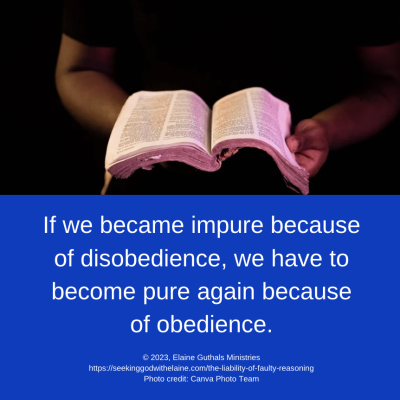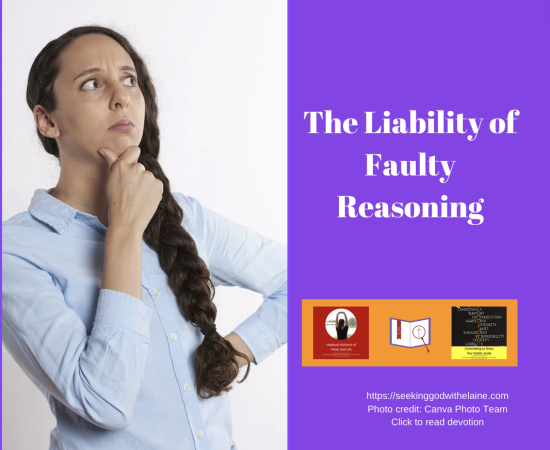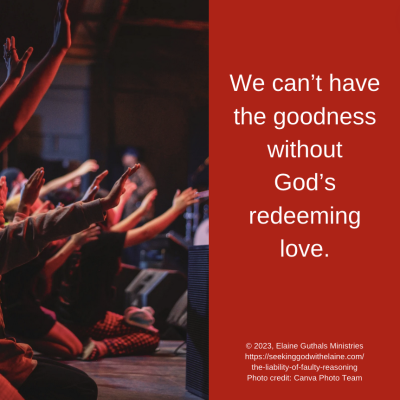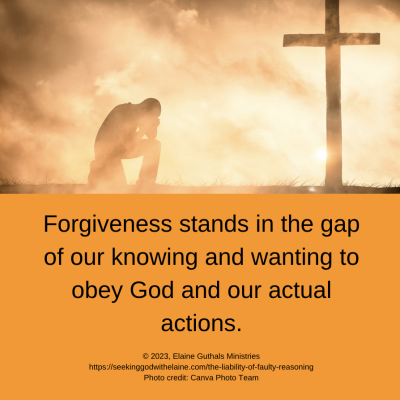The worldview tries to assert that what is in reality faulty reasoning isn’t. This devotional reading looks at what happens when that reasoning is followed.
Nuggets
- God allows us to reason things out to make decisions, but we have to lean on His understanding, not our own.
- We are wrong when we say God doesn’t condemn us.

This devotion is going to take sort of a different track than the last devotion on liability took. That one talked about how we sometimes feel guilty for sin.
In this devotion, we are going to look at some faulty reasoning that is really a sin — a liability.
Let's Put It into Context
To read devotions in the Habitual Holiness of Heart and Life theme, click the button below.
Here is a running list of nuggets for the theme.
Devotions in the Commit to Grow Our Habits study
Here is a running list of nuggets for the study.
Using Our Reasoning
“Come now, let us reason together, says the Lord: though your sins are like scarlet, they shall be as white as snow; though they are red like crimson, they shall become like wool” (Isa. 1: 18 ESV)
God allows us to reason things out to make decisions, but we have to lean on His understanding, not our own.
All of the self-help books prevalent these days makes it look like we can change ourselves. We can’t, not our true character.
We can’t find salvation in ourselves. Nothing we can do will wash away the stain of sin.
Salvation is the gift of life through the deliverance from condemnation and sin to acceptance and holiness and changes us from being spiritually dead to spiritually alive.
- Sin is not believing that Jesus is our Savior to save us from our actions by humans that disobey God and break one of His reasonable, holy, and righteous laws and commandments, goes against a purpose He has for us, or follows Satan’s promptings.
- Holy means to be set apart — because of our devotion to God — to become perfect, and morally pure while possessing all virtues and to serve and worship God.
- Perfection means we reach a state of maturity because the combination of the spiritual graces form, when all are present, spiritual wholeness or completeness — holy, sanctified, and righteous.
- Spiritual graces are worldly morals that have been submitted to God to further His kingdom instead of enhancing this world.
- Sanctified means to be set free from sin.
- Righteous means we are free from sin because we are following God’s moral laws.
- Pure means not being sinful or having the stain of sin.
- Virtues are standards of moral excellence.
- Perfection means we reach a state of maturity because the combination of the spiritual graces form, when all are present, spiritual wholeness or completeness — holy, sanctified, and righteous.
- Holy means to be set apart — because of our devotion to God — to become perfect, and morally pure while possessing all virtues and to serve and worship God.
- Holiness is the transcendent excellence of His nature that includes elements of purity, dedication, and commitment that lead to being set apart.
- Purity means possessing God’s moral character, having eliminated the stain of sin.
- Spiritual death is the spiritual separation from God that occurred as a consequence of Adam and Eve’s original sin.
- The spiritually alive are those who have ABCDed, so they are no longer separated from God.
The ABCDs of Salvation
If you have not become a believer in Christ, please read through the
Plan of Salvation and prayerfully consider what God is asking you to do.
A – admit our sins
B – believe His Son Jesus is our Redeemer
C – confess God as Sovereign Lord
D – demonstrate that commitment by making any changes needed in our lives to live the way in which God has called us
The Disciple’s Job Description
Glossary
Oh, but we try, don’t we? We read all about it, trying to get the book learning necessary to diagnose the problem.
We organize that information into a checklist. We try to figure out what a good person — one God would approve of — would look like. That way we can keep track of how close we are to the mark.
We try saying the right words — even if they are just words. In other words, we give lip service to God.
We don’t give Him our hearts, souls, minds, and strength. We don’t commit to Him.
We go at it all wrong. We can’t look at salvation for our souls from our perspective. Our perspective would be one in which we call the shots and do all the work to fix what we think is wrong.
Go back to the beginning. Sin entered this world because of one decision — mankind chose to disobey God. God said don’t do it — they went and did it anyway.
If we became impure because of disobedience, we have to become pure again because of obedience. Nothing else is going to fix it.

God alone gets to choose what that obedience looks like. He has chosen salvation through the death of His Son.
God is adamant that we have to come to salvation His way.
- “Salvation is found in no one else, for there is no other name under heaven given to mankind by which we must be saved” (Ac. 4: 12 NIV).
- You shall have no other gods before me. You shall not make for yourself an image in the form of anything in heaven above or on the earth beneath or in the waters below” (Ex. 20: 3-4 NIV).
- Jesus answered, ‘I am the way and the truth and the life. No one comes to the Father except through me’” (Jn. 14: 6 NIV).
There is no checklist. Actions alone won’t cut it. God wants a change of character — to be more like His character.
Morris gave evidence of this, stressing the importance of grace. He wrote, “As early as the time of Isaiah we find the doctrine of the reformation of character dependent on forgiveness of sin distinctly taught. God’s remedy for sin is the same in all ages. More prominence perhaps was given to the observance of the law in the olden times, but not to the exclusion of grace; while in the New Testament grace appears the more prominent, but surely not to the exclusion of law.”
Grace is a free and unmerited gift of love from the Heavenly Father, given through His Son, Jesus Christ, that enables salvation and spiritual healing to believers by the work of the Holy Spirit.
Resource
Glossary
This changing of our character is described in God’s Word as a washing.
- “Wash me thoroughly from my iniquity, and cleanse me from my sin!” (Ps. 51: 2 ESV).
- “Purge me with hyssop, and I shall be clean; wash me, and I shall be whiter than snow” (Ps. 51: 7 ESV).
God is very straightforward about Who does the cleansing. “But if we walk in the light, as he is in the light, we have fellowship with one another, and the blood of Jesus his Son cleanses us from all” (I Jn. 1: 7 ESV).
What God is asking of us isn’t too hard. Yes, it may be challenging, but He doesn’t set us up for failure.
What is our part in all of this? It is where we choose God. “Submit yourselves therefore to God. Resist the devil, and he will flee from you” (Jas. 4: 7 ESV).
Morris saw the “Come now, let us reason together …” (Isa. 1: 18 ESV) as more of the decision than the processing of the decision making.
The decision to follow God includes changing our habits and lifestyles to align with His Will.
One Big Faulty Reasoning
“For God did not send his Son into the world to condemn the world, but in order that the world might be saved through him” (Jn. 3: 17 ESV)
We are wrong when we say God doesn’t condemn us.
Worldview people like to tell just that God is only love and won’t judge us. If He does judge us, He won’t condemn us.
They point to John 3: 17 as their evidence.
Yes and no. This is one of those places where we have to read the whole thing.
“For God so loved the world, that he gave his only Son, that whoever believes in him should not perish but have eternal life. For God did not send his Son into the world to condemn the world, but in order that the world might be saved through him. Whoever believes in him is not condemned, but whoever does not believe is condemned already, because he has not believed in the name of the only Son of God” (Jn. 3: 16-18 ESV).
What does this say?
- God loves us, despite the fact that we are disobedient.
- God will not overlook this disobedience.
When it says, God didn’t condemn the world, it means that God chose to design a way so that the world could be restored to Him. In other words, He didn’t wash His hands of us.
God could have just as easily said that we would never listen to Him. There was no use for Him wasting His time trying to get us to right with Him, when we would always, always, always disobey Him.
God didn’t condemn us.
We did that to ourselves when we disobeyed God.
God chose to save us. McNeile gave us a good breakdown of what salvation is. He gave the following list:
- “To have all my sins pardoned.
- “To have my soul renewed unto holiness.
- “To have my body transformed into the likeness of Christ’s glorious body.
- “To reign with Christ.”
Resource
Notice number 3. Transformed, not remain as we are. Renewed into holiness.
We shouldn’t think God should be made to accept our actions and attitudes just because they are ours. We are nothing in His sight.
He is Sovereign God. He is our Creator. He is just and righteous and holy.
God is everything we are not.
We are using faulty reasoning when we say God has to accept whatever we throw His way.
He is Sovereign God. He gets to decide what is the way.

Making the Connections #1
Many worldview people want the goodness in their lives. They just don’t see that they can’t get it the way they are going after it — not real, honest to goodness goodness.
Morris explained where they are missing the boat. He wrote, “The essence of moral beauty is goodness. Now goodness is not a quality deposited in the heart and there shut up; nor yet a something to put on as a garment at will. Rather it is the fruit of well-doing — the outgrowth of a righteous life.”
Resource
It is the relationship with God part they are leaving out. It doesn’t work without Him.
We can’t have the goodness without God’s redeeming love.

Making the Connections #2
I really liked Morris’ sermon if you couldn’t tell. Another thing that struck me was this. He wrote, “As every duty of man is summed up in the command to reform, so all the riches of grace are summed up in the gift of pardon.”
Resource
It is an all-or-nothing deal with God. We can’t submit only part of ourselves to Him and call it enough. We have to be fully obedient.
That makes the reform a complete reform. We have to be more than made in His image. We have to be His image.
Making the Connections #3
We stress about our not being able to be 100% obedient. There are times when we just give up trying to be who God calls us to be.
We forget about the forgiveness. Forgiveness is, when we ask, the act of God pardoning us because we have shown repentance for breaking His laws and commandments, which allows us to become holy as He is.
- Repentance is acknowledging our separation from God and expressing sorrow for breaking God’s laws and commandments by making the commitment to changing ourselves through obedience so that we no longer do the wrong things.
- Obedience means submitting ourselves to the will of God as it is presented to us and living our lives accordingly.
Forgiveness stands in the gap of our knowing and wanting to obey God and our actual actions.

That doesn’t mean we are given license to sin. Sinful acts are still wrong.
God knows that we will be sinful creatures until He changes us when He calls us home. We can do what He is asking us to do in this life. He won’t set us up for failure.
Making the Connections #4
God lets us reason things out — to get around to accepting doing things His way. Only His way is the approved way.
Salvation can only be given to us by God only after we have fully submitted ourselves to Him. We have to acknowledge that He is Sovereign God.
Making the Connections #5
When we follow the worldview’s faulty reasoning, we aren’t following God’s reasoning. Come Judgment Day, if our names are not written in His book of life – meaning we have submitted our lives to Him – we will be judged accordingly.
“And I saw the dead, great and small, standing before the throne, and books were opened. Then another book was opened, which is the book of life. And the dead were judged by what was written in the books, according to what they had done. And the sea gave up the dead who were in it, Death and Hades gave up the dead who were in them, and they were judged, each one of them, according to what they had done. Then Death and Hades were thrown into the lake of fire” (Rev. 20: 12-14 ESV).
How Do We Apply This?
Give up trying to fix ourselves.
Learn to do good — God’s way.
Access God’s power through grace.
Admit when we don’t understand something in God’s Word and find someone who does understand it to help us.
Resources
Father God. We submit our lives to You. Not our will, but Your Will be done. We want to obey You in everything. Amen.
What do you think?
Leave me a comment below (about this or anything else) or head over to my Facebook group for some interactive discussion.
If you don’t understand something and would like further clarification, please contact me.
If you have not signed up for the email providing the link to the devotions and the newsletter, do so below.
If God has used this devotion to speak with you, consider sharing it on social media.